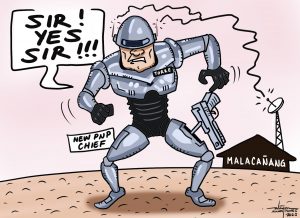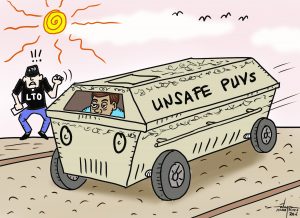Where is the Senate investigation on the so-called “PDEA leaks” headed to? Or, to be blunt about it, where would the Chair of the Senate Committee doing the probe Sen. Ronald “Bato” dela Rosa want the investigation to end up?
As part of the Senate’s oversight functions, normally the conduct of any probe relative to certain issues is intended to “aid in legislation” making. But from the way the Davaoeno senator is doing the probe it is as if he and his buddy Sen. Jinggoy Estrada are acting like they are prosecuting some of the resource persons to the point of shaming them in the public.
Senator Bato for his part is oftentimes ambivalent in his line of questioning and in making some comments even while the hearing is in progress.
Yes, we have been religiously monitoring through television the hearings conducted and there was an instance that Dela Rosa was saying there is absence of documentary evidence of the alleged leak, thus there is no leak to talk about. In another instance he and his friend Senator Jinggoy even took turns in questioning the credibility of their witness, a former PDEA investigator. They also put to task the experts from St. Luke’s Hospital who were the ones who conducted the drug test on the President because the brevity by which the result was determined – a little over 2 minutes.
In another instance the Committee chair was saying to the effect the leak indeed happened because the resource person-witness, the former PDEA agent, was supposed to be part of a raiding team that would have caught then Sen. Ferdinand R. Marcos Jr. allegedly taking cocaine inside a condominium unit reportedly owned by a well-known actress.
But no, it is not much on whether or not the leak is true. What is more conspicuous is the lack of finesse the Chairman has in conducting the probe and in dealing with the resource persons.
From our own perspective Senator Dela Rosa seems to be acting like a prosecutor in a case. In fact his line of questioning was even leading to where he apparently wants the probe to conclude.
This comportment of the Senator could only validate the suspicion of many that the primary objective of the probe he is conducting is “in aid of re-election,” which he may have succeeded slightly as consequence of some theatrics during the hearings.
But the way the proceedings were managed may not bode well to the more discerning voters who feel that the senator and his peers who tow his line of managing the hearing could have already crossed the line diving brashness and professionalism. Or, they were doing a circus that will effectively hide their trying to “navigate” in two rivers on their journey to re-election.
Yes, Dela Rosa et al. are trying their best not to slight both the administration and their main patron former President Rodrigo Duterte. Or else…
*************************
This newspaper reported the other day the skyrocketing of prices of prime commodities resulting to the steep rise in the Davao City’s inflation rate.
As always it is the disadvantaged sector of the city’s population who will suffer from the impact of the high prices.
We do not know if one or two, or three of our city councilors will endeavor to do some serious research to find out if the local government through the City Council can come up with some kind of implementing ordinance that will help existing national laws earlier crafted to hinder the oftentimes unreasonable rise in prices, effectively implemented at the local government level.
Remember the city’s partnership with the national government in establishing the so-called food terminal complex in Daliao, Toril? The primary intention of the said project is for the local farmers, especially those in the rural areas to have the facility to bring and store their produce and for the buyers, specifically the wholesale ones, to go to the complex and do their procurement in the facility.
The effort to have a common area where the farmers and the buyers meet and directly engage into the proper transaction is to avoid the practice of having levels of middlemen that is seen to further increase the cost of farm products.
Unfortunately both the national and local government have failed to install mechanisms that will make the transport of farm products to the food complex easier and less costly. Besides, the government has not looked into the problem that the farmers, especially the small ones, have long been held bondage. That is, their eternally indebted to wholesale buyers from the lowlands through the middlemen. Their indebtedness is due to their need to have money to buy pesticides, fertilizers, or even the need to sustain their families while waiting for harvest time.
Then when harvest season comes the farmers will again be confronted with the high cost of transporting their products to the food terminal complex.
It is on these areas where we believe the local law makers can look into in crafting ordinances that would ease the burden of farmers and other producers of prime commodities in marketing their products.
If the city through the Council can come up with ordinances that can subsidize or reduce the transportation cost then they could would have helped in deterring the skyrocketing of prices of prime commodities.


